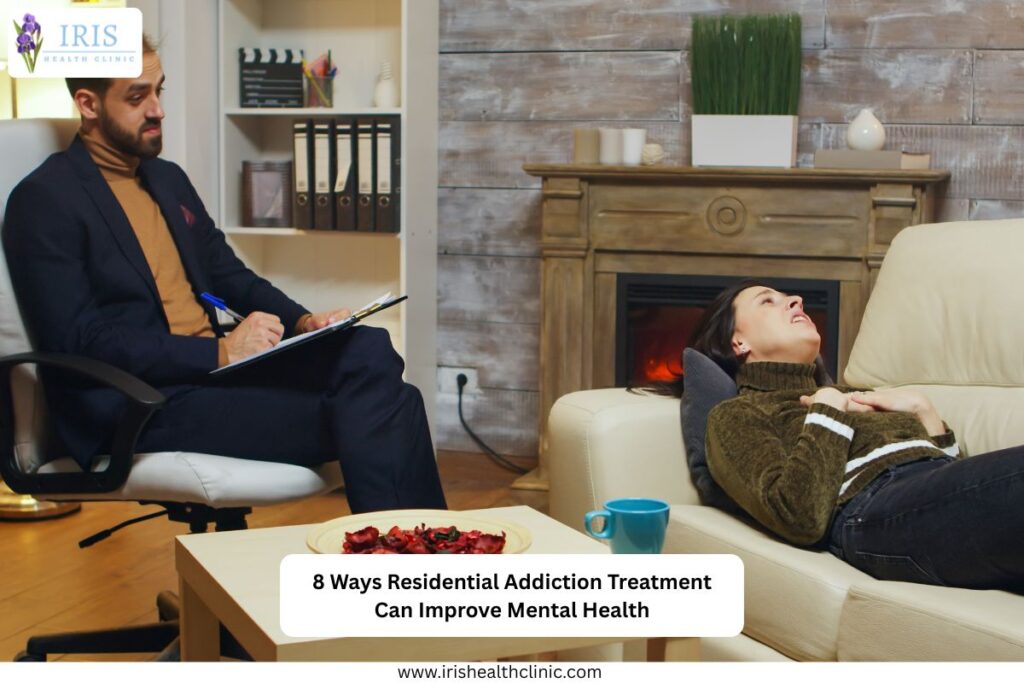This blog discusses the ways residential addiction treatment programs are used to treat both addiction and mental health. Understand how individuals can restructure their lives using evidence-based therapies and peer support.
Table of Contents:
- Round-the-Clock Professional Support
- Structured Environment Produces Stability
- Dealing With the Underlying Causes of Addiction
- Safe Medical Detoxification Process
- Comprehensive Therapy and Counseling
- Building Community Through Peer Support
- Holistic Healing for Mind and Body
- Planning for Long-Term Success
- Final Thoughts
- Frequently Asked Questions
Round-the-Clock Professional Support
Residential substance abuse treatment provides 24/7 access to medical practitioners and counselors in troubled times when the cravings are too hard to handle or the emotions too heavy to bear. The healthcare staff monitors vital signs and reacts to physical symptoms.
Withdrawal may create anxiety, depression, restlessness, and insomnia. Medications are provided by trained professionals, and emotional support is also given in the process.
Structured Environment Produces Stability
Residential Addiction Treatment creates a daily routine that instills discipline and concentration. This includes planned therapeutic sessions, group work, food, and time for personal reflection.
Most people who have substance use problems are not stable in their daily lives. The foreseeable routine in residential settings eliminates the chaos that comes with active addiction.
- Meditation, yoga, or journaling sessions start the day with mindfulness
- Special therapies, group sessions, and individual therapy are conducted throughout the day.
- Knowledge about addiction, mental health, and coping strategies.
- Processing the experience of the day and getting ready for continued growth.
- Sports and arts are useful in maintaining good health.
Dealing With the Underlying Causes of Addiction
Individuals may resort to drugs in order to address unresolved traumas, mental illnesses, or excessive stress in life. The residential drug program offers a secure environment to explore these underlying issues in a deep manner.
Trained therapists make people see how previous experiences affect their present behaviors. A significant number of participants find links between childhood trauma and patterns of addiction. Others become aware of how untreated anxiety or depression caused them to self-medicate.
Nearly 90 percent of Americans believe the country faces a mental health crisis, according to a 2022 survey. This is indicative of the fact that millions of people are struggling with mental health issues.
Safe Medical Detoxification Process
Drug rehab residential provides medically supervised detoxification to those individuals with severe substance use disorders. This controlled method averts hazardous complications, which may develop when one abruptly ceases drug use.
Doctors examine the needs of each patient and develop personal detox treatments. They treat withdrawal symptoms using proper drugs and continuous observation. Drug rehab residential support makes the process more convenient and secure.
As soon as the substances leave the system, the brain starts healing. Withdrawal, on the other hand, challenges the body. The process of detoxification cleanses the body to ensure that patients can concentrate on therapeutic activities.
Comprehensive Therapy and Counseling
Residential dual diagnosis treatment is based on the treatment of addiction and mental health disorders that co-occur at the same time. Certified therapists use a number of evidence-based modalities. Cognitive-behavioral therapy assists patients in recognizing and modifying dysfunctional ways of thinking. Dialectical behavior therapy imparts emotional regulation skills.
EMDR involves the healing of trauma that leads to addictive behaviors. Individual counseling sessions give the therapists time to work through feelings, goals, and create individual coping strategies. These are the individual sessions that supplement group work.
During residential dual diagnosis treatment, the neurotransmitter system of the brain, mostly dopamine and serotonin, starts to recover. These are chemicals that control mood, motivation, and pleasure. Patients feel better about themselves and are able to think more clearly as they stabilize.
Addiction is a problem that impacts not only the addict but also the whole family. The involvement of loved ones in the healing process enhances the support network and the long-term outcomes.

Building Community Through Peer Support
The suspension and expulsion rates of emotionally troubled students are as high as 64 percent. Also, approximately 28,000 students who have mental health concerns drop out every year. These people are imprisoned 63 times more often than college degree holders.
Group therapy establishes networks between individuals experiencing the same plight. Members exchange experiences, provide support, and keep one another accountable.
Patients watch fellow patients overcome and enjoy success. It is through these common experiences that hope is found and that it is possible to recover. Friendships are formed through casual interactions during meals or recreational time.
Holistic Healing for Mind and Body
Residential addiction treatment includes holistic treatments that consider the entire individual. Mindfulness meditation makes it less stressful and more present. Yoga enhances physical fitness, besides relaxing the mind.
Patients interpret complicated emotions through painting, music, or other artistic forms. These complementary methods are used alongside conventional treatments to lower the cortisol level, minimize anxiety, and improve general well-being.
Exercising is better in terms of circulation and brain performance. Frequent exercise also produces endorphins, which are quite natural mood elevators. Many individuals in active addiction do not pay much attention to their diet. Alcohol residential treatment programs offer nutritious food that supports recovery and physical wellness.
Planning for Long-Term Success
- Aftercare planning starts prior to the discharge of patients in residential treatment. Staff help people to develop their own relapse prevention methods that serve their own needs and triggers.
- Therapists help patients find out about patient services, support groups, and sober homes. This network brings the feeling of stability as a person becomes reacclimated to daily life.
- Substance use disorder relapse rates are similar to chronic diseases, such as high blood pressure and asthma. Addiction does not need temporary solutions but continuous management.
Final Thoughts
Iris Health Clinic is a residential substance abuse treatment facility in Wisconsin that provides 24-hour care depending on the needs of the individual. Their evidence-based practice deals with moderate and severe substance use disorders as well as other co-morbid mental health disorders. Patients are taught to identify situations that are high-risk. They use stress management methods to deal with cravings and hard emotions.
Frequently Asked Questions
Q1. What is the approximate duration of residential addiction treatment?
Programs often take 30 to 90 days, but others have the advantage of receiving extended care that lasts a number of months.
Q2. Can residential treatment address both addiction and mental health issues simultaneously?
Approximately 43.9 percent of adults with any mental illness used illicit drugs in 2022. However, the treatment of dual diagnosis deliberately focuses on treating the two conditions simultaneously.
Q3. What are the outcomes of residential treatment?
The patients move to the aftercare programs, such as outpatient care, support groups, sober living homes, and frequent visits to counselors.

